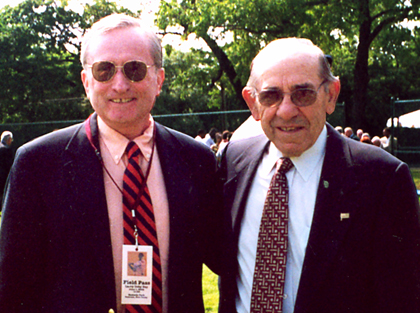
| NEWS |
| |
| FEATURES |
| ENTERTAINMENT |
| COLUMNS |
| CONTACT US |
| HOW TO SUBMIT |
| BACK ISSUES |
caption:
|
Former AL President Budig Makes His Pitch To Illuminate Baseball's Economic Issues
By Bill Alden
Gene Budig didn't exactly burn up the baseball diamond as a youngster growing up in Nebraska in the late 1940s.
He readily admits that his poor eyesight and slow bat doomed his playing career to end at the midget league level.
Despite his abbreviated stint as a player, Budig fell in love with the game, religiously listening to radio broadcasts of far away major league games and memorizing every player's stats.
After putting his sharp mind to use in a meteoric academic career which saw him head Illinois State University, West Virginia University and the University of Kansas over a period of 23 years, Dr. Budig became a major player in the world of baseball in 1994 when he was named as president of the American League.
Budig, who moved to Princeton upon taking the AL job which he held for six years, is making another contribution to the game he loves with the release this spring of his book The Inside Pitch ... And More, an examination of baseball's business and the public trust.
The book is an outgrowth of a course Budig taught at Princeton University from 2000-2002 entitled "The Business of Sports and the Public Trust," in which sports figures came before his students for no-holds-barred discussions of the economic issues facing sports in the 21st century.
Inspired by the intense conversations in his class, Budig decided to write the Inside Pitch so as to fully examine some of the more challenging and divisive issues facing sports. The slim 135-page volume contains 29 chapters which give the readers pearls of wisdom illuminating the inner workings of baseball and big-time athletics.
In Budig's view, the release of the book in conjunction with the beginning of the baseball season is particularly appropriate. "The book is a clear explanation of the history of baseball economics and it clearly points to the issues that have to be addressed," said Budig, who still resides in Princeton and is currently the scholar-in residence at The College Board of New York.
"It is a book that will enhance one's understanding of a national treasure. Baseball is a marvelous game. This is the time of year where no one has lost and everyone is a perceived winner in their town."
Budig realizes that he is a winner for having gotten the chance to head the American League. "I dreamed of some type of association with Major League Baseball but I never thought in precise terms," said Budig, who got into the search process for the job upon Dr. Bobby Brown's resignation at the urging of his friend and Kansas City Royals owner, the late Ewing Kauffman.
"I was a member of the Board of Directors of the Kansas City Royals. I understood the economics facing the Major League Baseball and the trials and tribulations of small market teams. I thought I could contribute and welcomed the opportunity to compete for the presidency. I was ecstatic when I got the job, it was a dream come true."
Soon after receiving his dream job, Budig realized he was in for a major change from the pace of academia. "In baseball there is not much time to deliberate," said Budig, who retains the professorial mien with his glasses and measured, detailed responses. "Issues in major league baseball require an almost instantaneous response. In the academic community, you had the luxury of thoughtful consultation. I was fortunate to be in a circle with a group of exceptional professionals."
His transition was eased with the considerable aid of two Hall of Famers, the late Larry Doby, and Bob Gibson. Budig said other important confidants in his tenure at the helm of the American League included the late Ted Williams, Yogi Berra, Cal Ripken, Jr., Jim Kaat, and David Cone.
A major segment of the book and Budig's tenure focuses on issues that led to the 2002 baseball labor agreement, which he regards as a turning point as baseball grapples with the challenges of the 21st century.
"It is an important point in history, it clearly showed the way," said Budig, referring to the 2002 pact. "As you look at the book, it explains in some detail the deliberations of the Blue Ribbon panel (independent experts chosen by the Commissioner to report on issues facing the game) and the resulting collective bargaining agreement. The existing agreement is a step in the right direction, it enhances competitive balance. More has to be done."
Budig, who proudly notes that he always read the baseball box scores first thing even when he was a university president, is proud to have influenced the course of the game.
"Baseball has been a long-term addiction," asserted Budig, who pointed out that all royalties from the book will be going to a national commission on writing, a project designed to help young people improve their writing skills. "It's a treasure. It became an important part of my life at an early age."
Budig never could have guessed the important role a failed midget leaguer from Nebraska would end up playing in the game.

